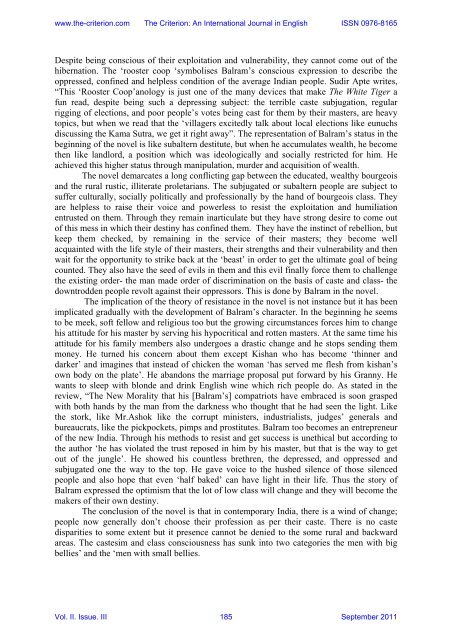Vol. II. Issue. III September 2011 - The Criterion: An International ...
Vol. II. Issue. III September 2011 - The Criterion: An International ...
Vol. II. Issue. III September 2011 - The Criterion: An International ...
You also want an ePaper? Increase the reach of your titles
YUMPU automatically turns print PDFs into web optimized ePapers that Google loves.
www.the-criterion.com <strong>The</strong> <strong>Criterion</strong>: <strong>An</strong> <strong>International</strong> Journal in English ISSN 0976-8165<br />
Despite being conscious of their exploitation and vulnerability, they cannot come out of the<br />
hibernation. <strong>The</strong> ‘rooster coop ‘symbolises Balram’s conscious expression to describe the<br />
oppressed, confined and helpless condition of the average Indian people. Sudir Apte writes,<br />
“This ‘Rooster Coop’anology is just one of the many devices that make <strong>The</strong> White Tiger a<br />
fun read, despite being such a depressing subject: the terrible caste subjugation, regular<br />
rigging of elections, and poor people’s votes being cast for them by their masters, are heavy<br />
topics, but when we read that the ‘villagers excitedly talk about local elections like eunuchs<br />
discussing the Kama Sutra, we get it right away”. <strong>The</strong> representation of Balram’s status in the<br />
beginning of the novel is like subaltern destitute, but when he accumulates wealth, he become<br />
then like landlord, a position which was ideologically and socially restricted for him. He<br />
achieved this higher status through manipulation, murder and acquisition of wealth.<br />
<strong>The</strong> novel demarcates a long conflicting gap between the educated, wealthy bourgeois<br />
and the rural rustic, illiterate proletarians. <strong>The</strong> subjugated or subaltern people are subject to<br />
suffer culturally, socially politically and professionally by the hand of bourgeois class. <strong>The</strong>y<br />
are helpless to raise their voice and powerless to resist the exploitation and humiliation<br />
entrusted on them. Through they remain inarticulate but they have strong desire to come out<br />
of this mess in which their destiny has confined them. <strong>The</strong>y have the instinct of rebellion, but<br />
keep them checked, by remaining in the service of their masters; they become well<br />
acquainted with the life style of their masters, their strengths and their vulnerability and then<br />
wait for the opportunity to strike back at the ‘beast’ in order to get the ultimate goal of being<br />
counted. <strong>The</strong>y also have the seed of evils in them and this evil finally force them to challenge<br />
the existing order- the man made order of discrimination on the basis of caste and class- the<br />
downtrodden people revolt against their oppressors. This is done by Balram in the novel.<br />
<strong>The</strong> implication of the theory of resistance in the novel is not instance but it has been<br />
implicated gradually with the development of Balram’s character. In the beginning he seems<br />
to be meek, soft fellow and religious too but the growing circumstances forces him to change<br />
his attitude for his master by serving his hypocritical and rotten masters. At the same time his<br />
attitude for his family members also undergoes a drastic change and he stops sending them<br />
money. He turned his concern about them except Kishan who has become ‘thinner and<br />
darker’ and imagines that instead of chicken the woman ‘has served me flesh from kishan’s<br />
own body on the plate’. He abandons the marriage proposal put forward by his Granny. He<br />
wants to sleep with blonde and drink English wine which rich people do. As stated in the<br />
review, “<strong>The</strong> New Morality that his [Balram’s] compatriots have embraced is soon grasped<br />
with both hands by the man from the darkness who thought that he had seen the light. Like<br />
the stork, like Mr.Ashok like the corrupt ministers, industrialists, judges’ generals and<br />
bureaucrats, like the pickpockets, pimps and prostitutes. Balram too becomes an entrepreneur<br />
of the new India. Through his methods to resist and get success is unethical but according to<br />
the author ‘he has violated the trust reposed in him by his master, but that is the way to get<br />
out of the jungle’. He showed his countless brethren, the depressed, and oppressed and<br />
subjugated one the way to the top. He gave voice to the hushed silence of those silenced<br />
people and also hope that even ‘half baked’ can have light in their life. Thus the story of<br />
Balram expressed the optimism that the lot of low class will change and they will become the<br />
makers of their own destiny.<br />
<strong>The</strong> conclusion of the novel is that in contemporary India, there is a wind of change;<br />
people now generally don’t choose their profession as per their caste. <strong>The</strong>re is no caste<br />
disparities to some extent but it presence cannot be denied to the some rural and backward<br />
areas. <strong>The</strong> castesim and class consciousness has sunk into two categories the men with big<br />
bellies’ and the ‘men with small bellies.<br />
<strong>Vol</strong>. <strong>II</strong>. <strong>Issue</strong>. <strong>II</strong>I 185 <strong>September</strong> <strong>2011</strong>
















